For safe herbal tea blends, you'll want to take into account your ingredient ratios carefully. Start with 50% mild herbs like chamomile or lemon balm for a soothing base. Add 30% aromatic herbs such as ginger or peppermint to enhance flavor and benefits. Finally, round it out with 20% stronger herbs like raspberry leaf for additional support. Remember to consult with your healthcare provider before trying new blends, and always brew with fresh, high-quality herbs. Balancing these ingredients can create the perfect tea for you, and there's plenty more to explore about herbal teas that could further enrich your experience.
Understanding Herbal Tea Safety
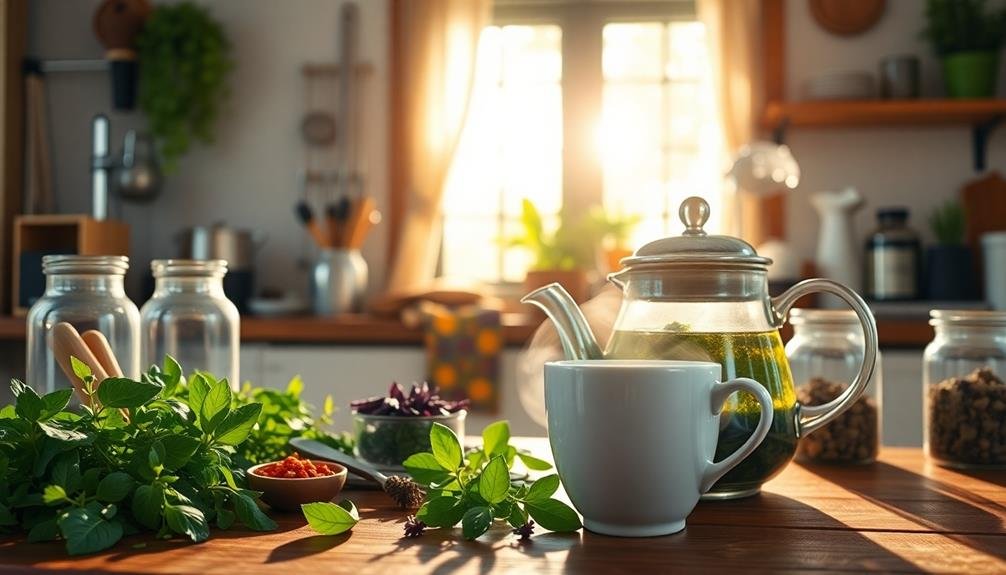
When it comes to herbal tea during pregnancy, safety should be your top priority. Not all herbal teas are created equal, and some can pose risks to you and your baby. Before you sip on that soothing blend, it's essential to research the ingredients thoroughly. Certain herbs can stimulate contractions, affect hormone levels, or even lead to complications.
You should also consult your healthcare provider, as they can guide you on which teas are safe and beneficial. Always choose reputable brands that disclose their ingredients clearly. Avoid teas with unknown or ambiguous herbal blends, as these can contain harmful components.
Keep in mind that moderation is key. Even safe herbal teas can have adverse effects if consumed in excessive amounts. Aim for small quantities and listen to your body.
If you experience any unusual symptoms, stop drinking the tea and consult a professional.
Essential Ingredients for Expecting Mothers
A soothing cup of herbal tea can be a comforting ritual for expecting mothers, but it's vital to select blends that support your health and well-being. Certain ingredients are particularly beneficial during pregnancy, offering various advantages to both you and your baby.
Here are three crucial ingredients to reflect upon:
- Ginger: Known for its anti-nausea properties, ginger can help ease morning sickness. It's also great for digestion, which can be helpful as your body undergoes changes.
- Peppermint: This invigorating herb can soothe digestive discomfort and reduce headaches. Its aroma may also help uplift your mood, making it a nice addition to your tea blend.
- Raspberry Leaf: Often recommended in pregnancy, raspberry leaf can tone the uterus and may help with labor preparation. It's rich in vitamins and minerals, promoting overall reproductive health.
Choosing these ingredients in your herbal tea can provide comfort and support during this special time.
Always consult with your healthcare provider before introducing new herbal remedies to guarantee they align with your unique health needs. Enjoy your tea moments!
Recommended Ratios for Blending
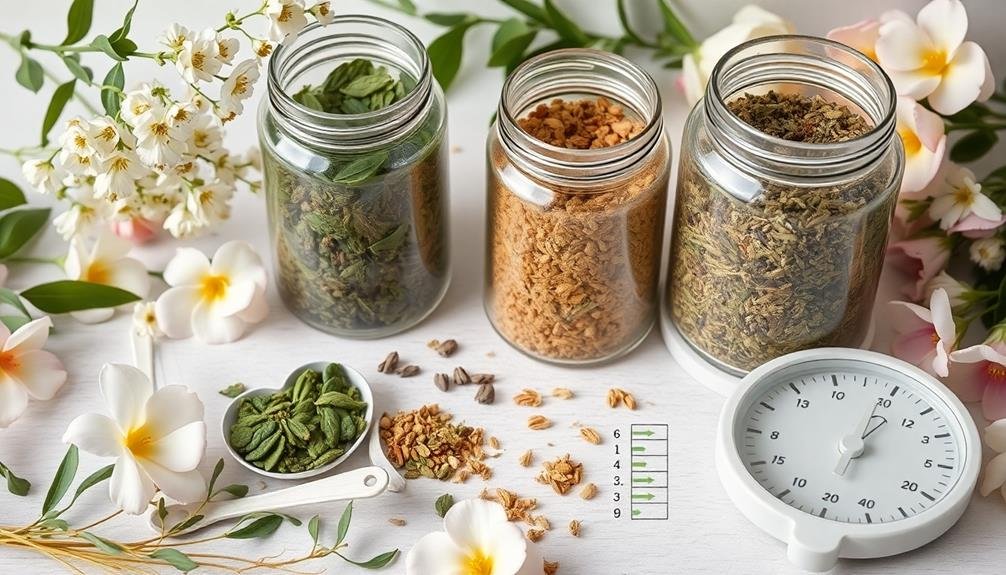
After selecting the right ingredients for your herbal tea, knowing how to blend them effectively is just as important. The ratios you use can considerably impact the flavor and benefits of your tea, especially for expecting mothers.
A good rule of thumb is to start with a base of 50% mild herbs. These could include chamomile or lemon balm, which are gentle and soothing.
Next, you can introduce 30% of your more aromatic herbs, like ginger or peppermint, to add depth and flavor. These herbs can also provide additional health benefits, but keep in mind their potency.
Finally, use about 20% of stronger herbs—like raspberry leaf or nettle—that offer specific support during pregnancy. This ratio creates a balanced blend that isn't overwhelming.
Always remember to adjust these percentages based on your taste preferences and specific needs. If you find a blend too strong, reduce the stronger herbs and increase the milder ones.
Similarly, if you're craving more flavor, tweak the aromatic herbs. Play around with these ratios until you find the perfect blend that suits your palate and health goals.
Happy blending!
Brewing Techniques for Optimal Flavor
Brewing herbal tea blends for expecting mothers requires attention to detail to guarantee you get the best flavor and health benefits.
To achieve this, follow these essential techniques:
- Choose Quality Ingredients: Always select high-quality herbs, as fresh or dried ingredients directly influence the tea's flavor. Organic options are often safer and more flavorful.
- Control Water Temperature: Different herbs require specific water temperatures for ideal extraction. For most herbal teas, using water just off the boil (around 200°F or 93°C) helps release all the essential oils and flavors without making the tea bitter.
- Steep Time Matters: The steeping time varies depending on the herbs used. Generally, aim for 5 to 10 minutes.
If you steep too long, you risk bitterness; too short, and you might miss out on flavor and benefits.
Storing Your Herbal Tea Blends
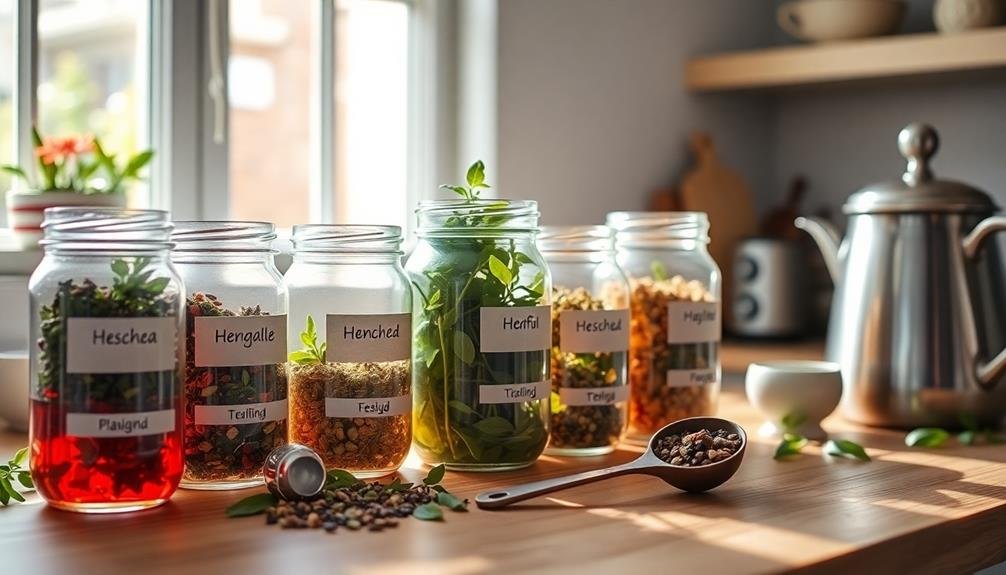
Proper storage of herbal tea blends guarantees they maintain their flavor and potency, which is essential for expecting mothers looking to enjoy their benefits.
To keep your blends fresh, choose airtight containers made from glass or opaque materials. Avoid plastic, as it can absorb odors and affect the taste of your teas.
Store your teas in a cool, dry place away from direct sunlight and moisture. A pantry or cupboard works well, but make sure it's not near heat sources like stoves or ovens.
Label your containers with the blend names and the date you prepared them to keep track of freshness.
Keep in mind that herbal teas generally have a shelf life of about six months to a year. After that, their flavors and beneficial properties may diminish. If you notice any changes in smell, color, or taste, it's best to discard them.
Lastly, when you're ready to brew, only take out the amount you need, and reseal the container quickly to minimize exposure to air.
Frequently Asked Questions
Can I Drink Herbal Tea During the First Trimester?
You can enjoy herbal tea during your first trimester, but be cautious. Some herbs may not be safe for pregnancy. Always check with your healthcare provider to verify your choices are safe and beneficial for you.
Are There Any Herbal Teas to Avoid While Breastfeeding?
While breastfeeding, you should avoid herbal teas like sage, peppermint, and parsley in large amounts, as they might affect milk supply. Always consult your doctor for personalized advice on safe herbal options during this time.
How Do Herbal Teas Affect Morning Sickness?
Herbal teas can help ease morning sickness by soothing your stomach and reducing nausea. Ginger, peppermint, and chamomile are popular choices, but always check with your healthcare provider to verify they're safe for you.
Can Herbal Teas Interact With Prenatal Vitamins?
Herbal teas can interact with prenatal vitamins, potentially affecting absorption. You should consult your healthcare provider to guarantee your tea choice won't interfere with the vitamins you're taking for a healthy pregnancy. Always stay informed.
What Are the Best Times to Drink Herbal Tea During Pregnancy?
You'll want to enjoy herbal tea during pregnancy when you're feeling the most stressed or tired. Sipping in the morning or afternoon helps you relax, but avoid it too close to bedtime to guarantee restful sleep.
In Summary
To sum up, enjoying herbal tea blends during pregnancy can be safe and beneficial when you choose the right ingredients and ratios. By incorporating essential herbs like ginger, peppermint, and chamomile, you can create soothing and flavorful teas. Remember to follow the recommended blending ratios and use proper brewing techniques for the best experience. With a little care in preparation and storage, you can savor your herbal tea while nurturing both your health and your baby's well-being.

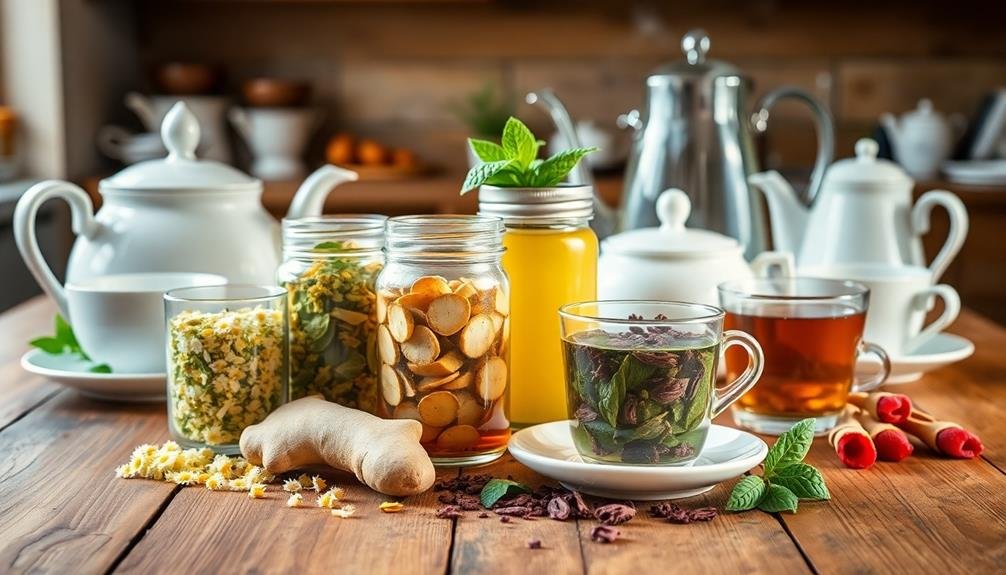

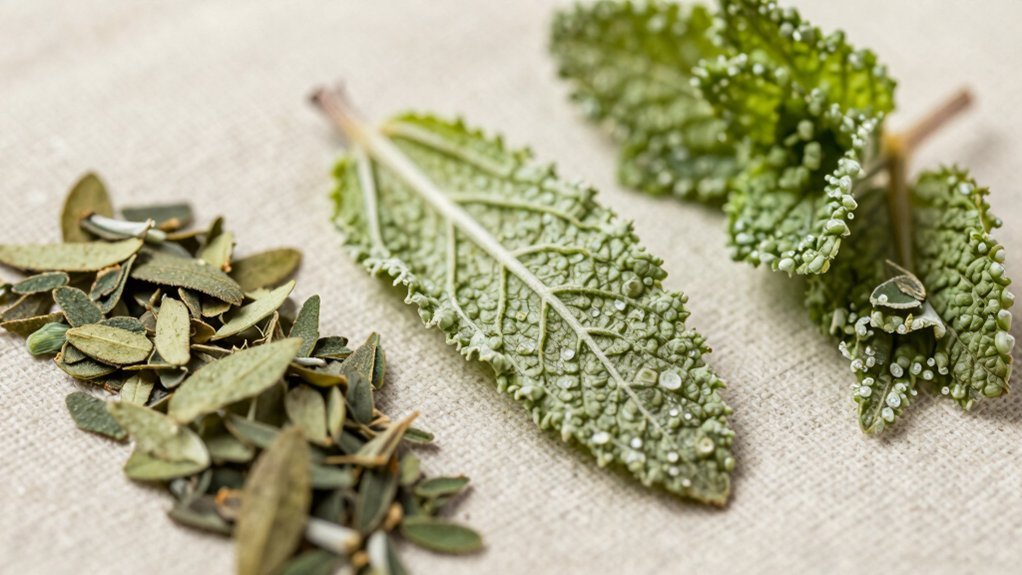

Leave a Reply